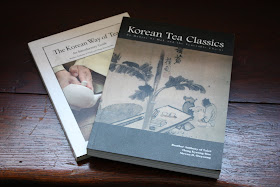
"There is a mystery in it all that is hard to put into words. If the heating is done evenly, the colour and scent of the tea will be beautiful. The subtle mystery is endless, the divine taste of tea is altogether wonderful."
from Cha Sin Jeon- A Chronicle of the Spirit of Tea, a copy of Zhang Poyuan Chalu recorded by Cho Ui, translated in Korean Tea Classics
Those who do not have a copy of Korean Tea Classics do please follow along and participate by referencing a different English translation available here from The Leaf.
This tea classic will be covered one section a week which will go on for 24 weeks. Feel free to jump in with your commentary at anytime.
Peace
from Cha Sin Jeon- A Chronicle of the Spirit of Tea, a copy of Zhang Poyuan Chalu recorded by Cho Ui, translated in Korean Tea Classics
Those who do not have a copy of Korean Tea Classics do please follow along and participate by referencing a different English translation available here from The Leaf.
This tea classic will be covered one section a week which will go on for 24 weeks. Feel free to jump in with your commentary at anytime.
Peace
Sorry I missed section one, but as my comment on picking tea relates to the drying of the tea, I think I will just post here. I have often heard it is bad to pick tea on a rainy day, and the more and more I think about what the effects of picking tea on wet day would have on the processing of tea, I think the biggest problem with picking tea on a rainy day has to do with the Drying step.
ReplyDeleteI mean teas are usually withered for quite some time and I wonder if the excess moisture would throw of the tea artisans timing and feel when drying the tea, or possible if it might even steam the tea along with just slightly frying it.
The precision of these instructions gives you all the information you need -- not for duplicating a specific product this year but for experimenting few years, several years, a lifetime, and learning to create an excellent tea.
ReplyDeleteAdam,
ReplyDeletePlease don't be apologetic, simply comment when you see fit. About the making tea on a rainy day- once tried some puerh that was picked and processed on a rainy day. The leaves were of good quality but there was something not right.
A link to a post on this tea:
http://mattchasblog.blogspot.com/2008/08/lessons-in-puerh-production.html
Rebekah,
No doubt the advice contained in Cha Shin Jeon is a good starting point but, of course, you can never master anything if you just read about it. Study, receive teachings in person, observe, experience, reflect, meditate... this is the most complete way of learning. As you stated it takes time.
Peace
All,
ReplyDeleteAs the quote states "There is a mystery in it all that is hard to put into words"...
The video speaks for itself...
A touch of Kim Shin Ho's mystery:
http://www.youtube.com/watch?v=9bGcUe5anhI
A touch of Mrs. Kim's mystery (see video in this post):
http://mattchasblog.blogspot.com/2008/05/making-green-tea-traditional-korean-way_16.html
If you know any others feel free to add the links.
Peace
I like the following sentence in the link you provide to another post: “The mysterious taste of tea starts with the sincerity of those who make the tea. It requires refined tea making skills and fine brewing to achieve harmony between water and tea.”
ReplyDeleteSo true!
Also in the link:
Tea leaves with white marks are acceptable.
What causes these marks?
Page 10, the master wrote “it is essential to steam the picked leaves three times and dry them three times, before grinding them very finely”.
Here, only twice. Yet, it obviously depends on the variety of tea that is processed.
Another question: no sun drying at the time the text was written?
Julien ÉLIE,
ReplyDeleteThe quoted text on that link is Yang-Seok Yoo's English translation found in The Book of Korean Tea.
One always thought the "white marks" were fine white hairs.
This statement belongs to section 3. Discerning the Quality of Tea.
The reference to the note on page 10 of Korean Tea Classics is in regards to a different type of tea, processed in a different way, from different eras.
Peace